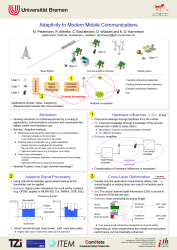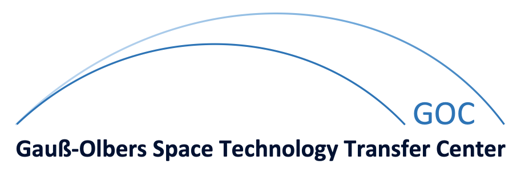Robust adaptive Multi-User Multi-Antenna systems with imperfect Channel State Information
Abstract
This project aims at the incorporation of different influences into the optimization of adaptive techniques for multi-user multi-antenna systems. On the one hand channel coding is often neglected in literature, on the other hand several imperfections regarding the channel state information have to be considered. Those imperfections are namely estimation errors, delays in the back transmission of such information and quantization errors. One main goal is therefore to develop optimization metrics which allow for the incorporation of the mentioned factors.
Introduction
The next step in the development of modern cellular mobile communication systems is currently developed under den name of Long Term Evolution (LTE). The growing requirements of mobile communications necessitate an elementary advancement of the wireless interface using the newest developments and technologies. Out of this concern OFDMA (Orthogonal Frequency Division Multiple Access) has been chosen as the Downlink access scheme in combination with multiple receive and transmit antennas which provides a high degree of flexibility serving different users. Thereby, adaptive concepts and ideas are of increasing significance for highly efficient mobile communication systems, because further increases in spectral efficiency in comparison to current systems will be strongly dependent on the ability to adapt to the current transmission conditions (including quality of service, mobility of the users and service requirements). Furthermore, the possibility of decreasing mobile equipment complexity and even enhancing battery life by central data processing at the base station is one of the attractive aspects of adaptivity. The aim of this project is the development, analysis and test of adaptive concepts. To this end the system parameters of Long Term Evolution will be used as an example scenario. Beginning with the information theoretical solution, numerical simulations up to actual evaluation with the help of our demonstrator hardware we aim at a comprehensive overview regarding the realizability and the effective gain of such systems. The ongoing standardization of LTE is assuming the use of adaptive algorithms, but many details still remain open. Especially, the optimization of adaptive methods regarding channel coding is largely open. Therefore, on the one hand this project will focus on link adaptation techniques for OFDMA considering channel coding and the additional degrees of freedom introduced by multiple antennas, and on the other hand aims at robust approaches regarding imperfect channel state information at the transmitter (delayed CSI, estimation errors, quantization)
Imperfect Channel State Information (CSI)
Multiple methods to use CSI at the transmitter, from bit and power loading, linear algorithms to non-linear precoders, usually assume perfect knowledge of the transmission channel. However, most of the time this assumption is not fulfilled, because of several error sources. Presuming that CSI at the transmitter has to be provided via feedback from the receiver, three factors have to be considered. On the one hand we have to use estimation techniques to gain knowledge of the channel and on the other hand we have to limit the feedback rate, e.g. by quantization. Additionally, feedback can be outdated due to the delay of th back transmission if the channel coherence time is smaller than this delay. In the simplest case these error sources can be interpreted as additional white noise, where the noise power can be dependent on the transmission power, thus leading to severe performance degradations.
The exploitation of imperfect CSI has been given much attention lately, focusing on two directions mainly. Firstly, combating the imperfections with so called “robust” approaches and secondly the development of new methods to use the lower amount of information available (especially regarding quantization). This projects mainly aims at the robust approaches with a special focus on the influence of channel coding.
The influence of channel coding
Many approaches how CSI at the transmitter can be used to enhance the error rate performance of a system are known from literature . However, mostly uncoded systems are treated and channel coding is totally neglected. Due to this, the proposed techniques do not lead to an optimization of the whole system performance also considering channel coding as no unique connection between bit error rate before and after decoding can be formulated independently of the system parameters, including the specific channel code used and the data rate. Especially, in regarding multiple antennas the description of the system becomes more involved, because a common parameter has to be found with which the quality of decoding can be described properly. One of the aims of this project is to find such quality indicators to optimize the whole system including channel coding. First results hint at the mutual information with finite transmit alphabets to be a good measure of decoding quality. Further candidates are the so called cut-off rate and additional bounds known from coding theory.
Interesting links
An overview poster regarding adaptivity in general
Details
| Duration: | 08/2007 - 09/2011 |
| Funding: | German Research Foundation |
Publications

-
Outage Capacity based Link Adaptation for BICM-OFDM with imperfect CSI
BibTEX

C. Bockelmann, D. Wübben, K.-D. Kammeyer
8th International Workshop on Multi-Carrier Systems & Solutions (MC-SS 2011), Herrsching, Germany, 3. - 4. May 2011 -
Robust Link Adaptation using SNR-Outage based Loading for BICM-OFDM
BibTEX

C. Bockelmann, D. Wübben, K.-D. Kammeyer
15th International OFDM-Workshop (InOWo 10), Hamburg, Germany, 2. - 3. September 2010 -
Link Adaptation for MIMO-OFDM with partial CSI
BibTEX

C. Bockelmann, D. Wübben, K.-D. Kammeyer
14th International OFDM Workshop 2009 (InOWo '09), Hamburg, Germany, 2. - 3. September 2009 -
Rate Enhancement of BICM-OFDM with Adaptive Coding and Modulation via a Bisection Approach
BibTEX

C. Bockelmann, D. Wübben, K.-D. Kammeyer
IEEE International Workshop on Signal Processing Advances in Wireless Communications (SPAWC), Perugia, Italy, 21. - 24. June 2009 -
Adaptive BICM-OFDM Systems
BibTEX

C. Bockelmann, D. Wübben, K.-D. Kammeyer
Springer Science+Business Media B.V., 7th International Workshop on Multi-Carrier Systems & Solutions (MC-SS 2009), pp. 15-24, Herrsching, Germany, 5. - 6. May 2009, ISBN 978-90-481-2529-6 -
Efficient Coded Bit and Power Loading for BICM-OFDM
BibTEX

C. Bockelmann, D. Wübben, K.-D. Kammeyer
69th Vehicular Technology Conference 2009 (VTC2009-Spring), Barcelona, Spain, 26. - 29. April 2009 -
Improving the Performance of BICM-OFDM Systems in Presence of HPA Nonlinearities by Efficient Bit and Power Loading
BibTEX


M. Petermann, C. Bockelmann, D. Wübben, K.-D. Kammeyer
International ITG Workshop on Smart Antennas (WSA 2009), Berlin, Germany, 16. - 19. February 2009 -
Adaptive Modulation and Interleaving for BICM-OFDM
BibTEX


C. Bockelmann, K.-D. Kammeyer
13th International OFDM-Workshop 2008 (InOWo 08), Hamburg, Germany, 27. - 28. August 2008 -
Mutual Information based Rate Adaptation for MIMO-OFDM Systems with Finite Signal Alphabets
BibTEX


C. Bockelmann, D. Wübben, K.-D. Kammeyer
International ITG Workshop on Smart Antennas (WSA 08), Darmstadt, Germany, 26. - 27. February 2008 -
On Allocation Strategies for Dynamic MIMO-OFDMA with Multi-User Beamforming
BibTEX


M. Petermann, C. Bockelmann, K.-D. Kammeyer
12th International OFDM-Workshop 2007 (InOWo 07), Hamburg, Germany, 29. - 30. August 2007









